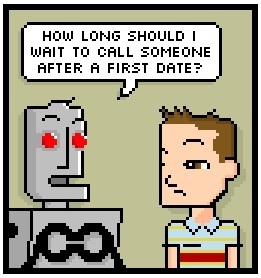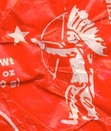Talking with Richard Stevens
Thisis the first in a very occasional series of interviews I plan to do.These first posts will concentrate on my new-found obsession: Webcomics.
 DieselSweeties.com ® R StevensIfyou're reading this, that means you're on the Internet and if you'reon the Internet, then you probably already know who Richard Stevensis. For those out of the loop, Stevens is the creator of the wildlypopular DieselSweeties.com. And Diesel Sweeties is among the firstgeneration of web comics. It's been in existence for eleven yearsnow. It's stood the test of time and the fickle tastes of amedia-saturated audience. And it's funny, too. Can't forget that.
DieselSweeties.com ® R StevensIfyou're reading this, that means you're on the Internet and if you'reon the Internet, then you probably already know who Richard Stevensis. For those out of the loop, Stevens is the creator of the wildlypopular DieselSweeties.com. And Diesel Sweeties is among the firstgeneration of web comics. It's been in existence for eleven yearsnow. It's stood the test of time and the fickle tastes of amedia-saturated audience. And it's funny, too. Can't forget that. Stevenswas nice enough to answer some questions about how he goes aboutmaking his web comic and how he balances it with the business that ithas inspired. (Short answer: He doesn't).
I'dlike to thank him very much for taking the time to speak to me.
AG:What led you to pursue web comics versus print comics?
RS:I never saw any kind of divide between the two. When I started(eleven years ago!) there wasn't much in the way of a professionalweb comics scene. The plan was to try out comic concepts online andget feedback before going to print. I just wound up never leaving.
AG:And what was the inspiration behind creating Diesel Sweeties?
RS:I wanted to write about relationships and thought that robots wouldmake a good stand-in for clueless men. It spiraled out of control andinto more of an ensemble cast gag strip and I was powerless to stopit.
AG:You did a syndicated version of Diesel Sweeties for a time, but thenstopped. Can you talk about that experience and why you decided tocease the syndicated strip? The old paradigm of comics seems like itwas you tried as hard as you could to get into syndication and thenyou did everything you could to maintain it.
RS:I did the syndicated version as an experiment when I was approachedby an acquisitions editor for a now-dead major syndicate. I neverplanned to or wanted to be in newspapers, but I figured I'd bestupid to turn down those guaranteed riches! The joke was on me whenI found out that newspaper comics sections were shrinking and fairlycalcified. I got out of my contract as soon as legally possible,thanks to a clause about a minimum level of income that I was nowherenear earning.
AG:Can you talk, in general terms, about the merchandise you sell on thesite? It seems that most web comics make money off of the things theysell. Was that part of your strategy going into the field, or was itsomething that developed over time?
RS:I can't speak for other cartoonists, but I really enjoymerchandise. I've always bought t-shirts and books and dumb littleawesome things, so offering them to people seemed like a natural fitfor me. This doesn't work for everyone. My theory is that youreally have to like what you're selling to sell it. Like everythingelse about my early business plan, the only plan was that there wasno plan. (it didn't hurt that I had a job at the time.)
AG:Were there strips you attempted before you tried Diesel Sweeties?
RS:Nothing major, notable or archived. I did minicomics in college, butthey are long gone.
AG:While there are recurring characters and plot lines that develop overtime, Diesel Sweeties feels like a gag strip. Have you everconsidered doing something with more of a narrative arc?
RS:It feels like a gag strip because that's what I'm aiming for. Mygoal has always been to write as close to Peanuts as I can but withcharacters who have sex. I've written and pitched some longerworks. Nothing's come to fruition yet, but it's certainlysomething I see myself doing.
AG:As a follow up, It feels like most successful web comics are gagstrips. Do you think it would be possible for a narrative strip tocatch on in the same way as gag strips?
RS:I guess it depends on your definition of "catch on". Storycomics are harder to merchandise, but I imagine they could moreeasily sell books. (or sell book rights to publishers) We live in aworld of apps and ebooks nowadays. There's no reason a narrativecomic couldn't be fabulously successful.
AG:When was the moment you knew that you were going to succeed? Did yougo into the web comics business with a definable end goal, or was itmore organic?
RS:I started with no goal and hopefully will never feel like I'vesucceeded. Even now, I still wonder how much longer I can survive asan independent artist. Hopefully a little longer!
AG:Do you follow a routine throughout the day? If so, can you describeit?
RS:I tend to do "office work" in daylight and creative work atnight. My drawing and writing time is generally from about 9pm tomidnight. My days are filled with t-shirt folding and mailing anddesigning and every other one of the billion tasks that pay thebills. Most days, I don't know what I'll be doing until I'vedone it.
AG:How do you balance the creative and business aspects of DieselSweeties?
RS:I daresay I don't have any balance in any aspect of my work life. Inever miss deadline and never give up that window of comics time atthe end of the day. That's the closest I can think of.
AG:And how does social media fit into the mix? You seem particularlyactive on Twitter. Is this part of an overall strategy to drivetraffic to the site, or are you just blowing off steam?
RS:Twitter feels like it was designed for me. I used to throw silly awaymessages on my IM and screw around on message boards. Nowadays, I getto do my goofy short writing for a large audience. I see it as acombination of communication and a second comic strip. It cracks meup when people following me have no idea I draw a comic but stickaround for my puns.
AG:Do you see yourself continuing with Diesel Sweeties forever, or doyou think you might end it someday to pursue other creative ventures?
RS:Couldn't say. I think if I thought about the end, I'd loseinterest. I am mentally committed to hitting 3,000 comics and willgive it some thought then. That'll be somewhere around twelve yearsof work!
AG:Is there any parting advice you'd give to someone consideringstarting up a web comic?
RS:Don't be one of those jerks who posts an update schedule on yoursite only to constantly apologize for missing deadlines. Just be whoyou are and work at the best pace you can. Never apologize foranything. Do your work and get better every day.
Published on October 06, 2011 12:00
No comments have been added yet.



